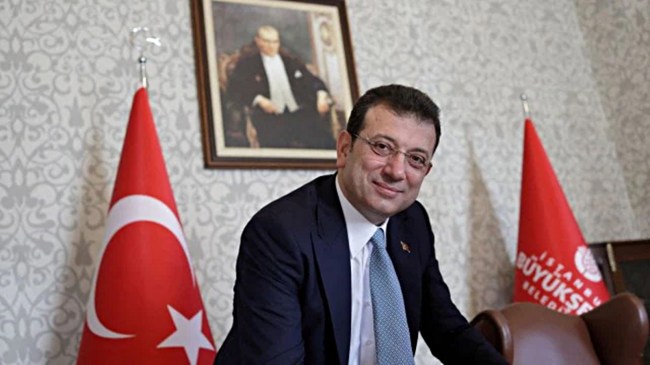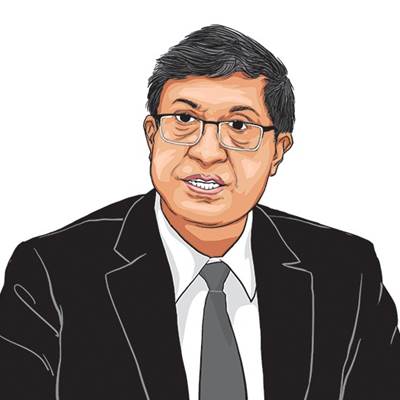Opinion Former ambassador to Turkey Sanjay Bhattacharyya writes: In Turkey, a battle between a return to democracy and a slide towards autocracy
An extended prison term could weaken Imamoglu’s status and thwart the momentum for building a viable opposition to Erdogan ahead of the elections
 Ekrem Imamoglu, the popular and charismatic mayor of Istanbul. (Source: File)
Ekrem Imamoglu, the popular and charismatic mayor of Istanbul. (Source: File) As the Republican People’s Party (CHP) was preparing to confirm the candidate for the next presidential election, Ekrem Imamoglu, the popular and charismatic mayor of Istanbul, who I met during my tenure as Ambassador to Turkey soon after he was elected, was arrested and jailed on corruption charges. Along with his close political associates and campaign organisers, hundreds of activists, students, journalists and others were also placed in detention.
The police took him away to Marmara prison just after he recorded a message speaking against autocracy, which went viral, entrusting his fate in the hands of the people. Sensing an opportunity, the CHP converted an internal party session to a voting process across the country, galvanising 15 million voters, or about 25 per cent of the electorate, to nominate Imamoglu for the Presidential election.
Orhan Pamuk, celebrated Istanbul resident and Nobel laureate, said Turkey’s limited democracy is coming to an end, and the country’s most popular politician, who would have won a majority of votes in the next national election, is in jail. There is a sense of dread but also a mood of resistance among the people. Unfazed by the memories of the crackdown at Gezi Park in 2013 when there were mass protests against the removal of the green space, the people have come out in large numbers to register their solidarity with the jailed mayor.
Opposition parties have come together to call for economic boycotts. Wider protests have been organised to force the government to release Imamoglu from what they call politically motivated charges. The ruling Justice and Development Party (AKP) remains steadfast in pursuing his prosecution and has denied charges questioning the judiciary’s independence. They have also forced Istanbul University to withdraw the degree awarded to Imamoglu, a prerequisite for a presidential candidate in Turkey.
Recep Tayyip Erdogan has been in power since 2003, first as prime minister and now as president. The younger generation in Turkey has not seen any leader other than Erdogan. The AKP delivered rapid economic growth in the first decade of its rule. However, the quest for establishing a neo-liberal New Turkey with power vested in the presidency, promotion of new economic elites, an export-determined growth model and social service networks linked to religious institutions did not proceed on the anticipated path. Turkey experienced economic slowdown, financial crisis, currency depreciation, social tensions and the weakening of traditional secular institutions. Despite the economic crisis and popular discontent, Erdogan’s personal charisma has prevailed and the AKP has managed to retain power in a country split down the middle, although the margins have become slimmer. The next election could be the toughest for the AKP so far.
Imamoglu’s brand of social democratic municipalism contrasted sharply with the AKP’s agenda. He prioritised high-quality social services through secular networks to alleviate the hardships faced by the common man. His measures, which include providing milk to children, bread and subsidised meals for families, monitoring domestic violence, and establishing decent healthcare and daycare facilities, have become a template replicated by other CHP Mayors in different municipalities. That Imamoglu’s leadership provided an alternative economic agenda became a matter of concern for the AKP.
Erdogan has always been larger than the AKP, and there is no potential rival within the party. Yet, until recently, the election process in Turkey has remained relatively free, even if it was sometimes questioned by the opposition due to the AKP’s dominance over state institutions and media. In recent years, political commentators have noted that the AKP has applied a carrot-and-stick policy to deal with opposition leaders and prevent opposition unity. Authorities have detained several Kurdish mayors, often on charges of links with separatists, and appointed government trustees as replacements. The AKP has negotiated the mainstreaming of Kurds, including a peace accord through the Kurdistan Workers’ Party head Abdullah Ocalan. Recently, right-wing nationalist leader Umit Ozdag, who has a large following, was arrested for insulting the president. But most notable were the charges against top CHP leaders like Imamoglu in Istanbul, Mansur Yavas in Ankara and others. The opposition’s fear is that the ruling party is creating conditions to deny credibility and opportunity to popular leaders to contest the next election.
Although certain European leaders have reacted loudly to the arrest of Imamoglu, most are prepared to give Erdogan a long leash given the Turkish role in the mediation of the war between Russia and Ukraine, its prominent role in NATO and its dominant position in Syria. Erdogan does not foresee any pressure from the US on this issue. He seems confident that he will ride the tide over Imamoglu’s arrest. Unlike his own arrest in 1999, when he had emerged stronger from prison and rose to become a national leader, an extended prison term could weaken Imamoglu’s status and thwart the momentum for building a viable opposition ahead of the elections. A battle of attrition between a return to democracy and a slide towards autocracy is in the making.
When I met Imamoglu in 2019, he remarked that the people of the city were breathing fresh air after 25 years of AKP rule, and he would nourish their dreams in the same spirit with which Mustafa Kemal Atatürk had created the Republic of Turkey. The CHP has traditionally maintained an open position devoid of any religious tinge on engagement with India. Imamoglu had hoped to forge closer bonds between the peoples of both nations. Whether he succeeds nationally or not will depend on the strength of the people’s agitation and the extent of Erdogan’s will to retain power.
The writer is a former diplomat, former Ambassador to Turkey and currently professor of diplomatic practice at O P Jindal Global University





